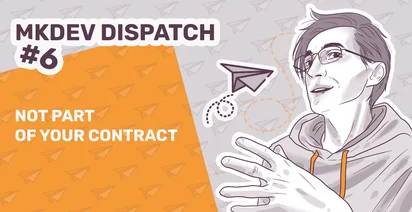Not Part of Your Contract | ✉️ #6

Hey! 👋
This month I was quite unpleasantly struck by the story of an independent musician who composed music for the video game Doom. If you follow the industry in any way, you've probably heard something about the Mick Gordon controversy and his open letter, and the very unpleasant response from Bethesda. What shook me about this story is that in a way it opened my eyes to the fact that even if you have a contract to work for, a big company can still screw you over.
You don’t say, right? But it reminded me of many times when we were discussing certain contracts, SLAs and proposals inside the team, and Kirill and Pablo (especially Pablo) would often correct me and draw my attention to unclear wording. "Leo, it's a contract," they told me. "We have to be clear about how much work we're committing to do." In hours or in clauses, either way the contract requires very clear language. What has to be done, how and when, and according to what quality criteria.
Which is right. But even though I agreed each time, I still felt some protest inside against such a strict framework. Because it limits me and my company's ability to surprise the client, to be creative, to do something more. And a kind of fear to appear as an entitled asshole, not willing to do more than his contract stipulated. And this naivety continued to live in me, even though I myself have fallen victim several times to either no contract at all, or to the lack of more strict framework in the contract.
But this story with Mick Gordon changed something in me. I guess when you realize that this kind of thing can happen even in big, world-renowned companies whose products are used by millions, you start to look at things differently. This is no longer a local story that can only happen to me.
Anyway, where was I going with this? Just think of it as another reminder to read carefully the contracts you sign. Do not be shy about discussing the terms and criteria by which your work will be evaluated. And don't be afraid to say no if something is not part of your contract.
But how to say no so as not to look like an entitled asshole is, of course, another matter. If you have stories of how something like this happened to you, write me back to this email. Maybe I'll put together a guide on how to say no to an employer.
What we've shared
Where is the container image? What's inside the container image, and how the image is stored on the filesystem.
And a bigger preview of our GCP Workshop.
Is Google Cloud Config Connector the solution?: We are going to learn and understand how Config Connector works, and if it is a tool that can replace Terraform.
In 'DevOps Accents', episode 2 we talk about why companies move to the cloud, why they leave it and everything in between.
What we've discovered
SRE SLOs: A Practical Guide for SREs on Defining SLAs, SLIs, and SLOs.
Using IAM Roles Anywhere: A walkthrough of this new feature. It could be especially useful in a multi-cloud environments, where another cloud is used more as an extension or data residency exception.
Lambda and Java: Tips on using Java for Lambda functions, and whether it makes sense at all (it does!).
Replacing cloud with a bare metal server: We love a sober view on whether going for cloud and cloud architecture is worth it. This article explores it from cost and maintenance perspective, with some really good examples.
Optimizing TCP for high WAN throughput while preserving low latency: When CloudFlare writes about network optimization, it is worth reading.
A random reminder
Our new feature is free bi-weekly webinars. For example, here's "AWS Load Balancer Controller 101", you can register for free to attend it on the 10th of December.
The 7th mkdev dispatch will arrive on Friday, December 9th. See you next time!
